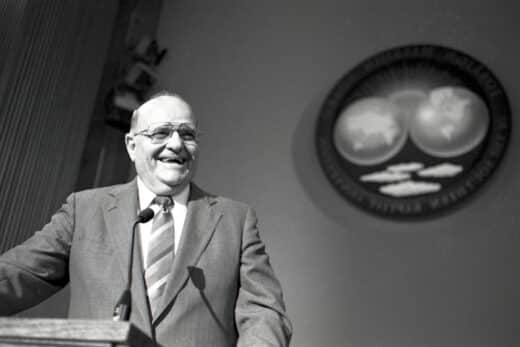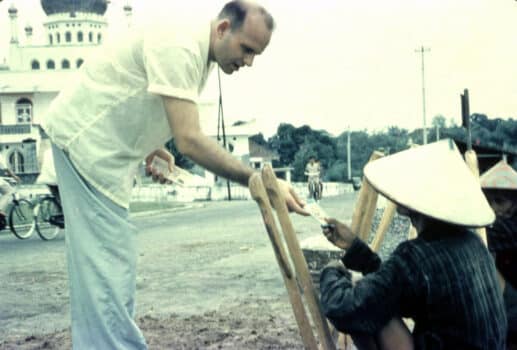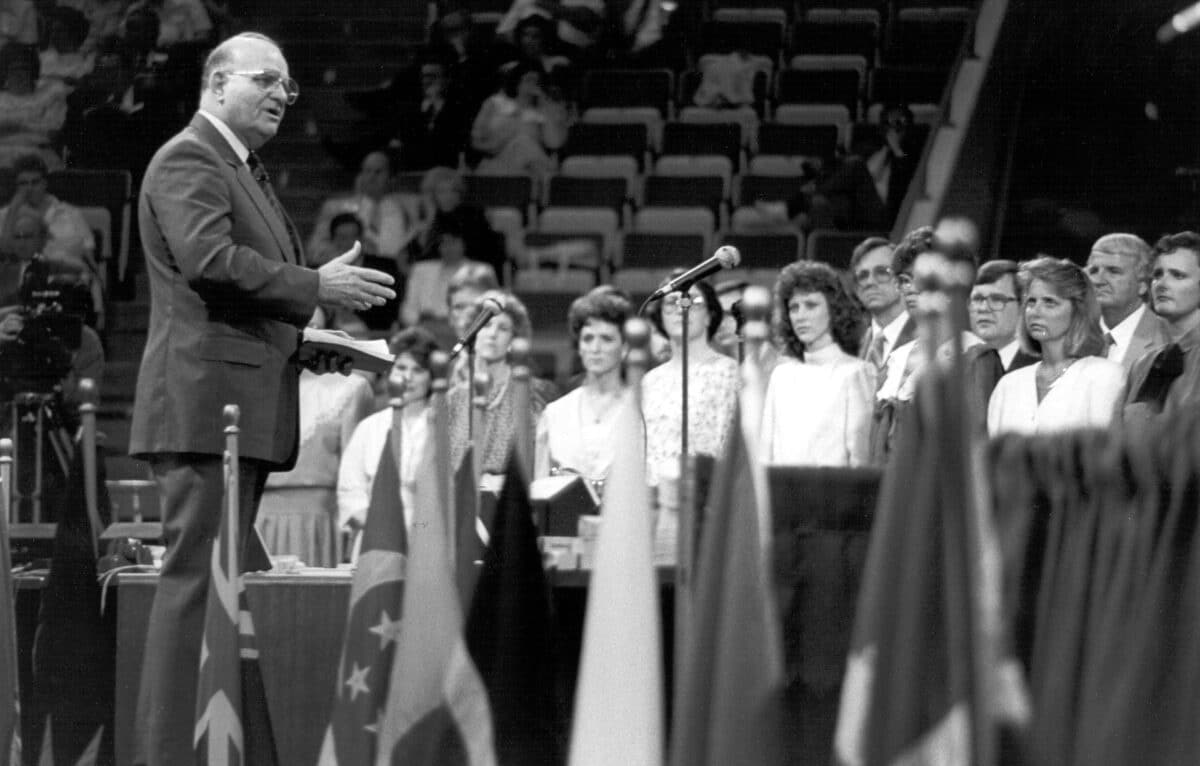Keith Parks, missions leader who played a key role in opening Southern Baptists’ eyes to the millions of unreached peoples worldwide, died Aug. 26, 2025. He was 97.
International Mission Board President Paul Chitwood expressed his gratefulness for Parks’ legacy. “We celebrate that Keith Parks and his wife gave decades of their lives to serving Southern Baptists in our cooperative mission work to get the gospel to the nations,” Chitwood said. “While Keith served as president during a complicated time in Southern Baptist life, his intentional focus on taking the gospel to the unengaged is a lasting legacy that still marks IMB strategy to this day. I am grateful for that legacy.”
Parks, a native of Memphis, Texas, got his first taste of international missions as a student summer missionary to Colombia’s San Andrés Island. Thirty years later, when a reporter asked the newly named president of the Southern Baptist Foreign Mission Board to describe himself, Parks responded, “I am a missionary.” That remained his identity until the end.

Keith Parks, Foreign Mission Board president from 1980 to 1992, addresses trustees meeting in the Foreign Mission Board chapel. (IMB photo)
Parks spent 45 years in international missions, serving as ninth president of the FMB (now IMB) from 1980 to 1992. He and his wife, Helen Jean, were missionaries to Indonesia for 14 years before he joined the home office staff, where he served in several administrative roles.
Todd Lafferty, IMB executive vice president and chief operating officer, also served on the mission field in Indonesia, in addition to other countries, before joining the U.S. staff. Lafferty said, “Keith Parks’ visionary and strategic leadership led us from familiar mission stations to unmarked roads in the missionary task to reach the least reached. His legacy lives on as we continue to seek to reach the remaining unengaged, unreached peoples in the world today.”
Parks retired as FMB president in 1992 and became the first missions coordinator for the Cooperative Baptist Fellowship.
“Parks’ leadership thrust the IMB into an unprecedented era of effectiveness toward fulfilling the Great Commission,” said Jerry Rankin, who succeeded Parks as the mission board president.
“Missionary deployment around the world exploded under Parks’ predecessor, Dr. Baker James Cauthen,” Rankin said, “but Parks looked beyond successful growth to see that part of the world still unreached and closed to missionary presence.”
Parks’ presidency at the FMB coincided with world-changing events that brought new dangers — and opportunities — for Christian missionaries: the rapid spread of HIV/AIDS, growing numbers of terrorist attacks and assassinations, the end of apartheid in South Africa, the fall of the Berlin Wall, the Tiananmen Square protests, the dissolution of the Soviet Union, and the proliferation of new technologies and birth of the World Wide Web.
Parks’ leadership was a match for the times. Southern Baptists in 1976 had adopted a goal of preaching the gospel to everyone in the world by the end of the century. It fell to Parks to determine what it would take to reach that goal.
The goal has yet to be reached, but research into what it would take yielded “crushing statistical evidence that without an enlarged vision of the world, Southern Baptists would never contribute their full share to global evangelization,” wrote Leland Webb, editor of the FMB’s The Commission magazine at Parks’ retirement.
What the research revealed was more than 6,000 unreached peoples — ethnolinguistic groups who lived with few, if any, Christians among them — had little or no access to Scripture and did not welcome missionaries. The 1.9 billion people in those groups would likely never hear the name of Jesus.
“Keith Parks was a missiologist par excellence,” Clyde Meador once said of Parks. “He would do what he saw as right whether it was popular or not.” Meador filled several key roles, including executive vice president, at the IMB before his death in 2024.
What Parks did was urge missionaries to develop daring new strategies to reach the unreached. This gave birth in 1985 to Cooperative Services International, which assigned teachers, doctors, businessmen and humanitarian workers to countries closed to traditional missionaries. Later, the nonresidential missionary program was born for missionaries to develop creative ways to reach unreached people they could not live among.
“Parks’ vision positioned Southern Baptists to respond to the fall of the Soviet Union and laid the groundwork for changes that followed his tenure to focus on people groups instead of countries and engaging the unreached,” said Rankin.
Parks also challenged Southern Baptists to consider countries where missionaries had long worked as partners in reaching the world. On his last overseas trip as FMB president, to participate in a meeting of Baptist leaders from across the Americas, Parks challenged participants to begin sending their own missionaries as partners in God’s mission.
“Too many Christians in this world are convinced their responsibility is only to the people of their culture and language,” Parks said. “We’ll never reach the world for Christ if we restrict ourselves to our own language and culture. Local interest always wins when culture dominates Christianity. Global interest wins when Christianity dominates culture.”

Missionary Keith Parks witnesses to laborers in Djokjakarta, Indonesia. He and his wife, Helen Jean, served as missionaries in Indonesia for 14 years. (IMB photo)
After serving as pastor of Red Springs Baptist Church in Seymour, Texas, and as an instructor in Bible at Hardin-Simmons University in Abilene, Parks and his wife, the former Helen Jean Bond, were appointed in 1954 as career missionaries to Indonesia, where they served until 1968.
There he served at the Baptist Theological Seminary of Indonesia in Semarang, Java. He also did evangelistic work in Semarang, was mission treasurer in Jakarta and spent a furlough as an associate secretary in the missionary personnel department at the FMB’s home office in Richmond, Va.
Parks joined the home office staff in 1968, leading work in Southeast Asia from 1968 to 1975; directing the mission support division from 1975 to 1979; serving as executive director-elect, September through December 1979; and executive director (title changed to president in May 1980) from Jan. 1, 1980, to Oct. 31, 1992.
Parks earned a Bachelor of Arts degree from North Texas State College (now University of North Texas) in Denton, and Bachelor of Divinity and Doctor of Theology degrees from Southwestern Baptist Theological Seminary in Fort Worth.
Parks’ wife of 69 years, Helen Jean, and their daughter, Eloise, both died in 2021. Parks is survived by three sons: Randall (Nancy), Kent (Erika), and Stanley (Kay); grandchildren and great-grandchildren.
Parks was the author of Crosscurrents (Convention Press, 1966), World in View, A.D. 2000 Series (New Hope Press, 1987) and numerous articles and columns. He is the subject of Keith Parks: Breaking Barriers & Opening Frontiers, a biography by Gary Baldridge.
— Mary Jane Welch began writing for the International Mission Board shortly before R. Keith Parks became president.
